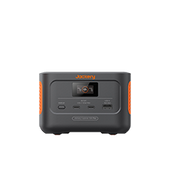Will My LiFePO4 Battery Lose Charge When Not in Use?
As the demand for energy storage and portable power solutions increases, so does the necessity for understanding the intricacies of battery technology. You cannot expect a battery pack from three years ago to provide the same quality of charge today. Battery backup simply isn't that straightforward.
This is why many UK buyers try to determine how long a battery charge will last. You don't want to get a battery pack out of storage for your upcoming whirlwind trip to Greece only to find it cannot hold more than a 25% charge, even after being plugged in all night. You want a solution that is battery efficient, offers longevity, and gives you charging reliability no matter where you go next.
Enter the LiFePO4 battery, also known as the Lithium Iron Phosphate battery. This is a well-known energy solution because of its unique properties and advantages over other options. The LiFePO4 battery is rapidly becoming a preferred choice for many, especially in portable power solutions. But does it stand up to the test of time? How does it fare when left unused? And how does it compare to its counterparts in terms of self-discharge?
As the demand for energy storage and portable power solutions like Jackery's portable power stations increases, understanding the intricacies of the LiFePO4 battery's self-discharge becomes crucial.

Understanding the Details of Self-Discharge Batteries
Regardless of its type or the device it powers, every battery undergoes a phenomenon called 'self-discharge.' This is when a battery gradually loses its charge over time, even if not connected to a device.
How quickly that rate of self-discharge occurs and the extent of future use of your battery pack will drastically differ on a ton of different factors. Each of these issues will dramatically impact how well your battery works over its intended lifespan – especially when it comes to efficient charging itself or your plethora of devices.
What affects your rate of self-discharge? It will depend on your product. Portable power stations using a LiFePO4 leisure battery are bound to be more reliable than others. However, some factors that can impact self-discharge, even in a LiFePO4 battery, include:
- Temperature: Whenever the temperature gets too high, the electrochemical material around the battery pack will change in activity rates. Side reactions can occur, drastically impacting positive, negative, and electrolytes as they become more intense and lose the capacity for a charge.
- State of Charge:If you always keep your batteries at 100% charged by plugging them in, then you will have a higher self-discharge rate. It is better to let your battery drain a little so that you can still get that capacity when you need a full charge.
- Battery Lifespan:The more batteries age, the harder it is to maintain a charge. The chemical and internal composition degrade a little over time, making it much harder to build a charge up to 100%. A great example of this is your smartphone. Go and check on its capacity even after a month's use, and you'll see self-discharge.
LiFePO4 vs. Lead-Acid
When it comes to self-discharge rates, LiFePO4 batteries have a distinct advantage over traditional lead-acid batteries. LiFePO4 batteries generally exhibit a lower self-discharge rate, making them ideal candidates for long-term storage. This ensures that devices powered by these batteries remain functional even after prolonged periods of inactivity.
The primary difference between a LiFePO4 battery and a lead acid option is that the life cycle for a LiFePO4 battery is over 4,000 (10 years daily). That is 8 times what you can expect from a flooded lead-acid battery that only gets 500 life cycles (1-2 years).
Then there are factors like weight. Lead acid batteries are much like those you find in cars, golf carts, or heavy lawn equipment. They weigh quite a bit and cannot recover from a discharge below 20%.
The final part you need to worry about is leakage. Even though it is rare, lead acid batteries have chemicals in liquid form that can get outside the casing and cause a serious mess and potential damage to you and your family. The better option is always going to be a portable power station from Jackery that uses a LiFePO4 battery.
Recognising the prowess of LiFePO4 batteries, companies like Jackery have incorporated them into their line of portable power stations, ensuring longevity and reliability.
The Role of the Battery Management System (BMS)
Anytime you want to look at a solar generator and battery backup system, you should consider how the Battery Management System (BMS) powering these components works. Why? Because that will inform you of how well the overall efficiency and balancing can improve the lifespan of your LiFePO4 battery pack.
Jackery's portable power station options use advanced BMS to ensure you get the most out of your investment. This way, you can enjoy outdoor lighting while on a road trip to Leeds or a relaxing BBQ with the family in Stanford.
What is a Battery Management System (BMS)?
At its core, a BMS is an electronic system that manages and monitors the performance of rechargeable LiFePO4 batteries. Think of this as the 24/7 security guard operating the various screens and equipment at a power station. The BMS will calculate different information that oversees essential battery functions. This, in turn, ensures you get decent longevity, optimal safety, and overall safety whenever you need a power station outside or indoors.
For LiFePO4 batteries, in particular, the BMS becomes an indispensable component, given the unique attributes and potential vulnerabilities of these battery types. There are many multifaceted, critical functions Jackery's BMS conducts. The more essential include:
- Cell Balancing: Battery cells, over repeated charging and discharging cycles,can develop imbalances in their charge states. The more imbalanced your battery packs, the harder it is to maintain efficiency, and the more likely you'll see a drop in battery lifespan. Jackery's BMS works hard to maintain a balanced state of charge, optimising the performance and longevity of your LiFePO4 battery charger.
- Temperature Monitoring: Temperature fluctuations can significantly impact the health and safety of a battery. Extreme temperatures, whether too high or too low, can damage battery cells or even pose safety risks. Without the BMS in place, your LiFePO4 battery cells can shift in composition due to heat or cold. Once that happens, it is tough to recoup the charge capacity naturally.The BMS will take proactive measures to adjust the charging rate or even shut it down in some instances to prevent cellular damage.
- Overcharge/Discharge Protection: Every battery has its limits built into the lifespan. If you consistently overcharge or discharge a battery, you can impact its efficiency or potentially damage its overall composition. The BMS from Jackery and an attached solar generator monitor the max and min charge capacity of associate LiFePO4 battery packs – preventing any threshold issues.
- Voltage and Current Monitoring: Continual monitoring of the voltage and current is essential for the smooth functioning of the battery. Any unwanted anomalies or sudden spikes in usage can and will create potential problems. The BMS keeps a close eye on these parameters, ensuring they remain within the designated safe limits.
Selecting a Jackery Power Station for Your Battery Needs
We live in a fast-paced, power-driven time when the need for reliable, high-capacity, portable power solutions is next to pretty much anything else. You want a simplified solution that can give you all the power you need for your puppy's mobile cleaning stations and all the digital devices you need on your family's road trip to the coast.
At the top of any shopping list is going to be the team behind Jackery. With this internationally facing company, well aware of the unique power and electricity needs of the UK, you get decades of experience offering premium quality portable power stations in the UK. Many of these options include LiFeOP4 battery solutions that can give you all the electricity and rechargeable efficiency when you're away from home.
Some of the more creative solutions include the Jackery Explorer 1000 Pro Portable Power Station and the Jackery Explorer 2000 Plus Portable Power Station. Both products embody Jackery's commitment to superior quality, cutting-edge technology, and customer-centric design.
Benefits of the Jackery Explorer 1000 Plus Portable Power Station:
- Ultra-Fast Charging System: Achieves a full wall charge in just 1.8 hours and can be solar charged quickly with the Jackery SolarSaga 200WSolar Panel.
- Power On the Go: Designed to be lightweight at 32 lbs. and boasts a foldable handle for ultimate portability.
- Safety First: Incorporates a pure sine wave inverter that ensures stable power, reducing the risk of equipment damage.
- Versatile Charging Options: Features 2 USB-C, 2 100W PD ports, 2 1000W AC ports, 1 USB A, and a DC car port.
- Durable and Long-Lasting: Designed to support up to 4000 charge cycles with a remarkably low self-discharge rate.
-
Built for the Outdoors: Comes equipped with three LED light modes – low, high light, and SOS, catering to a variety of outdoor scenarios.

Benefits of the Jackery Explorer 2000 Plus Portable Power Station:
- Expandable Capacity: Starts with a 2-kWh capacity but can be expanded up to a whopping 12 kWh.
- High Power Output: Capable of powering heavy-duty devices up to 3000W.
- Ultra-Fast Solar Charging: It takes only 2 hours for a total solar charge using six Jackery SolarSaga 200W Solar P
- Unparalleled Lifespan: Utilises an outstanding LiFePO4 battery boasting a 10-year lifespan.
- ChargeShield Technology: Enhances safety and increases battery pack lifespan by 50% with its leading-edge fast charge technology.
-
Smart Control: Allows users to control and monitor the device using the dedicated Jackery App for a seamless user experience.

Why Choose a Jackery Product with a LiFePO4 Battery Pack?
Jackery's unwavering dedication to delivering unparalleled portable power solutions is evident in its line-up. By incorporating LiFePO4 batteries in their products, Jackery ensures users get the best of both worlds—high performance and durability. This isn't some off-the-shelf power charger that tends to bust out when the temperature gets too hot or after only a short operation of use. These are premium quality solutions that you can rely on for years (with the guarantee from Jackery to back them up!).
When you choose a Jackery solar generator or portable power station with a LiFePO4 battery in the UK, you get the following:
- Low Self-Discharge: LiFePO4 batteries inherently have a lower self-discharge rate. You get much longer charge retention that helps with long-term storage or usage in your caravan, car, camping gear, outbuilding, or cabin.
- Safety: These batteries are known for their stability, reducing the risk of overheating or catching fire, and ensuring user safety.That offers a lot of peace of mind when you consider how many younger users rely on battery packs for mobile devices or gaming gear.
- Eco-Friendly: LiFePO4 batteries are less harmful to the environment compared to other battery types, aligning with the green initiatives of the UK government and ensuring you get a brand that supports your social efforts.
- Longevity: These batteries boast a longer lifespan, ensuring that users get the most out of their investment. With up to 10 years of daily use, that is a long time to enjoy outdoor camping, remote work, and so much more.
- Optimised Performance: LiFePO4 batteries, coupled with Jackery's cutting-edge technology, ensure that users receive consistent power output, making it ideal for a plethora of applications, from outdoor adventures to emergency power back-ups.
Conclusion
Yes, the world of batteries you can choose from varies a ton. Trying to find a cost-effective and long-term solution takes a bit of research. That is why picking a LiFePO4 battery is such a good choice, especially from Jackery.
Instead of having to worry about discharge or lifespan cycles, go with an option that ensures you get all the power solutions you need on the road, while camping, in a tiny house, or even the next time your uncle wants to go ice fishing and you still want a smartphone to stream Netflix in between catches.
Explore all Jackery has to offer, check out their great article on LiFePO4 batteries, and bring home a portable power station that lets every one of your future adventures remain worry-free.
Related Articles:
LiFePO4 VS Lithium-Ion Batteries: Which One Is Right for You
Advancing Sustainability: The Environmental Impact of LiFePO4 Solar Batteries
LiFePO4 Battery in Focus: A Comparative Review of Jackery Solar Generator 2000 Pro and 2000 Plus






















































































